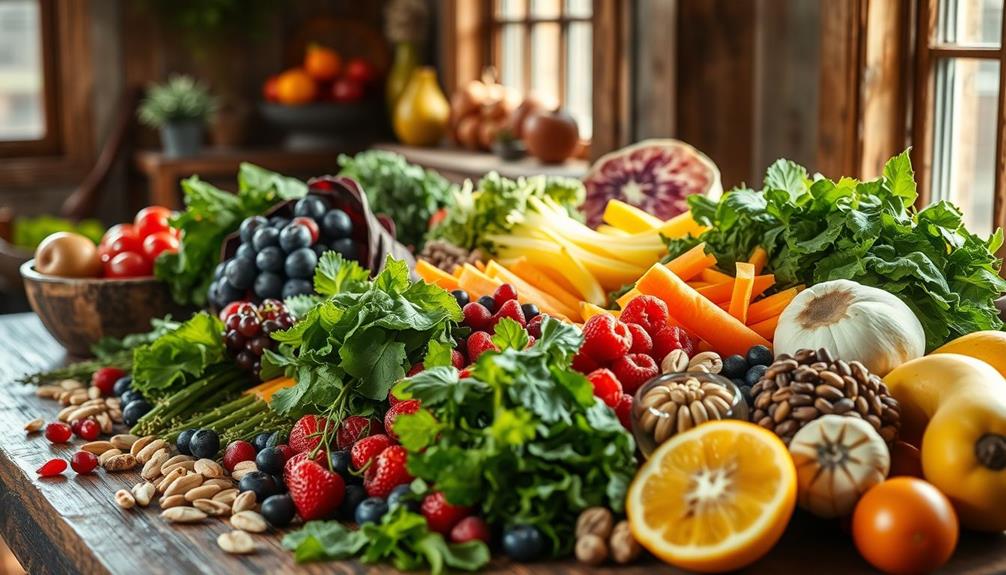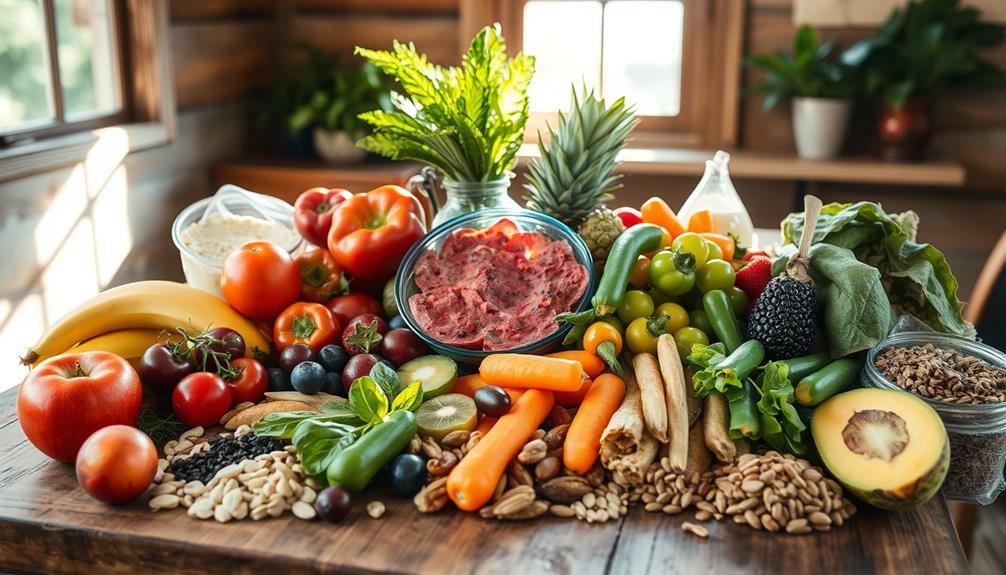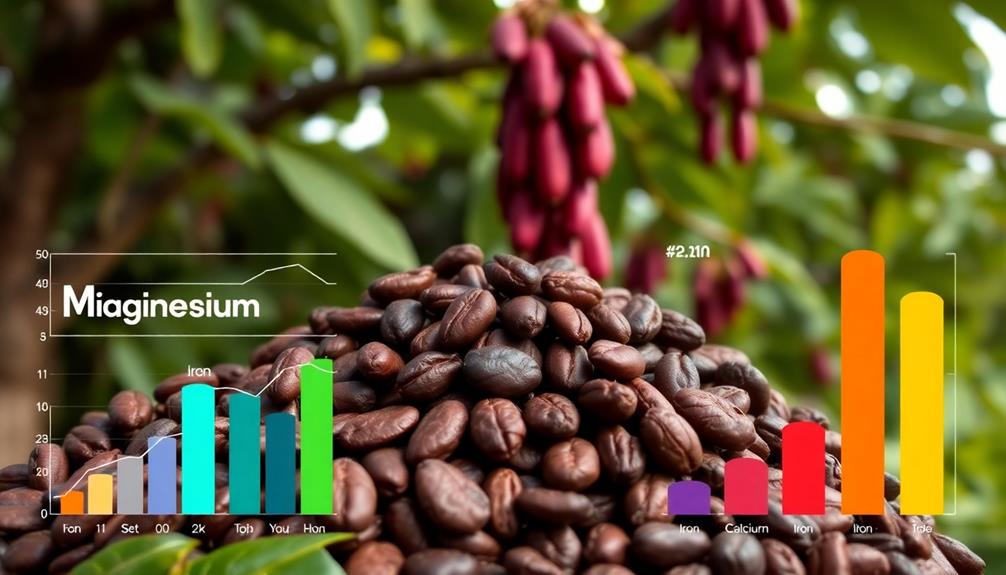The raw food diet claims to boost your health by focusing on uncooked, unprocessed foods that retain essential nutrients and enzymes. By consuming a diet rich in fruits, vegetables, nuts, and seeds, proponents suggest that you can experience increased energy levels and improved digestion. It also purports to support weight loss and lower the risk of chronic diseases like heart disease and diabetes. However, it's important to be aware of potential nutrient deficiencies and other risks associated with strict adherence. Discovering the finer details might clarify what works best for you.
Key Takeaways
- The raw food diet claims to boost energy levels through the consumption of nutrient-dense, unprocessed foods.
- It is said to promote weight loss due to high fiber content that enhances digestion and satiety.
- Advocates argue that it reduces the risk of chronic diseases like heart disease and type 2 diabetes.
- The diet emphasizes the intake of antioxidants and natural enzymes for improved gastrointestinal health.
- Proponents suggest that consuming raw foods leads to better overall health and wellness.
Overview of Raw Food Diet
The raw food diet focuses on eating uncooked and unprocessed foods, like fruits, vegetables, nuts, seeds, and sprouted grains. Advocates claim that cooking destroys essential nutrients and natural enzymes, which play an important role in digestion. By consuming raw foods, you're tapping into their full potential and maximizing health benefits.
The diet typically aligns with veganism, though some variations allow for raw dairy, eggs, or meats, depending on personal choices. Many followers aim to make at least 75% of their meals raw, prioritizing whole, organic ingredients while steering clear of processed foods and added sugars. This emphasis on uncooked foods encourages you to focus on the quality of what you eat, ensuring you get the most nutrients from your meals.
Additionally, the diet has been shown to enhance nutrient absorption and boost immune system function due to high vitamin and antioxidant levels, which can contribute to overall wellness benefits of raw food. Historical roots of the raw food diet extend back to the 19th century, with figures like Sylvester Graham promoting the dietary claims surrounding natural, unprocessed foods.
In adopting the raw food diet, you're encouraged to explore a variety of whole ingredients, enhancing your meals with vibrant flavors and textures while potentially improving your overall well-being.
Health Claims and Benefits
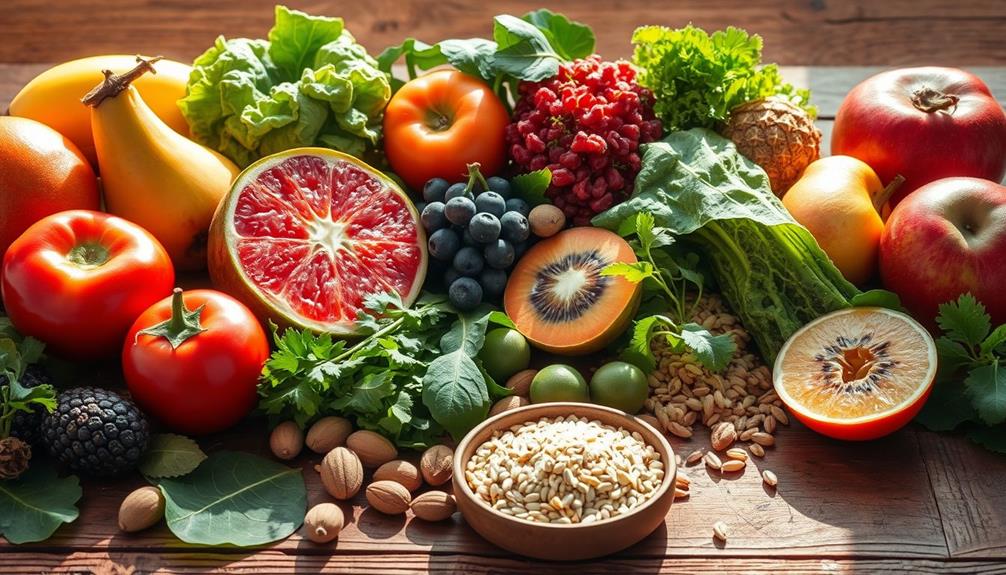
Many followers of the raw food diet report increased energy levels and liveliness, attributing these benefits to the nutrient-dense, minimally processed foods they consume. They believe that the high fiber content of raw foods aids digestion and promotes satiety, making it easier for you to achieve weight loss due to the lower calorie density of fresh produce.
Additionally, raw food enthusiasts often emphasize the importance of detoxification and cleansing purposes in maintaining their health.
Health claims surrounding the raw food diet suggest that it may reduce the risk of chronic diseases like heart disease and type 2 diabetes. Improved blood pressure and cholesterol levels are often cited as potential benefits.
By focusing on foods rich in antioxidants and natural enzymes, proponents argue that you're preserving the nutrients essential for peak health. These natural enzymes can aid digestion, leading to better gastrointestinal health and nutrient absorption.
Some studies have shown that individuals on raw vegan diets can experience significant weight loss, with an average of 22-26 pounds lost over 3.5 years.
If you're considering the raw food diet, you might find that these health claims align with your goals for improved energy, weight management, and overall well-being.
Nutritional Content and Deficiencies
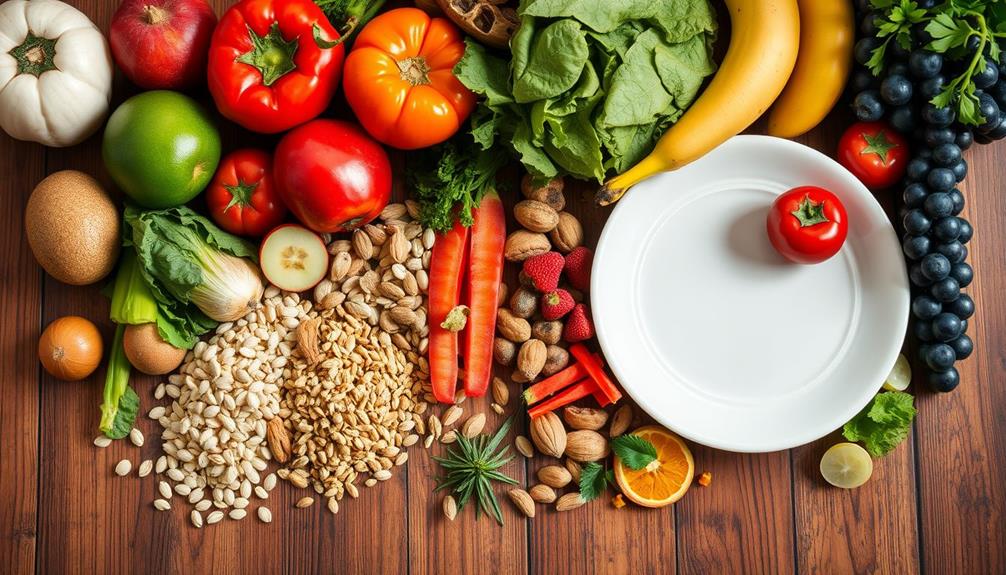
Following a raw food diet can provide a wealth of vitamins, minerals, and antioxidants from fruits, vegetables, nuts, and seeds. However, it can also lead to nutrient deficiencies if you're not careful. For instance, you mightn't get enough essential nutrients like vitamin B12, calcium, and vitamin D.
These deficiencies can impact your health in several ways: individuals with certain mental health disorders, such as Borderline Personality Disorder, may experience heightened emotional instability due to inadequate nutrient intake.
- Inadequate protein intake can result in muscle loss and decreased bone density.
- Low calcium and vitamin D levels are linked to lower bone mass, increasing fracture risk.
- High fruit consumption may lead to dental issues due to acidity, raising the risk of tooth decay.
- Irregular menstrual cycles and reproductive issues might occur due to low calorie and nutrient intake.
To maintain overall dietary balance, it's vital to monitor what you consume on a raw food diet.
You might need to reflect on supplementation or careful meal planning to guarantee you're getting all the nutrients your body requires. Ignoring these aspects could lead to serious health consequences, so being informed and proactive about your nutrition is significant.
Food Preparation Methods

Often, those on a raw food diet prioritize specific food preparation methods to retain maximum nutrients and enzymes. By keeping temperatures below 104°F to 118°F, you guarantee that the natural enzymes in your foods remain intact.
Common techniques include soaking and sprouting grains and legumes, which enhance their digestibility and nutrient availability. Incorporating raw ingredients like essential oils for oral health can further support your overall well-being.
Juicing and blending are also popular methods, allowing you to create nutritious drinks and smoothies without cooking. High-power blenders and food processors help you achieve the desired textures while maintaining the raw quality of your ingredients.
Dehydrating is another effective way to prepare meals, enabling you to enjoy snacks like raw fruit leathers and crunchy veggie chips.
However, while you embrace these methods, thorough washing of raw fruits and vegetables is essential. This step helps mitigate the risk of foodborne illnesses associated with consuming uncooked foods.
Risks of Raw Food Diet
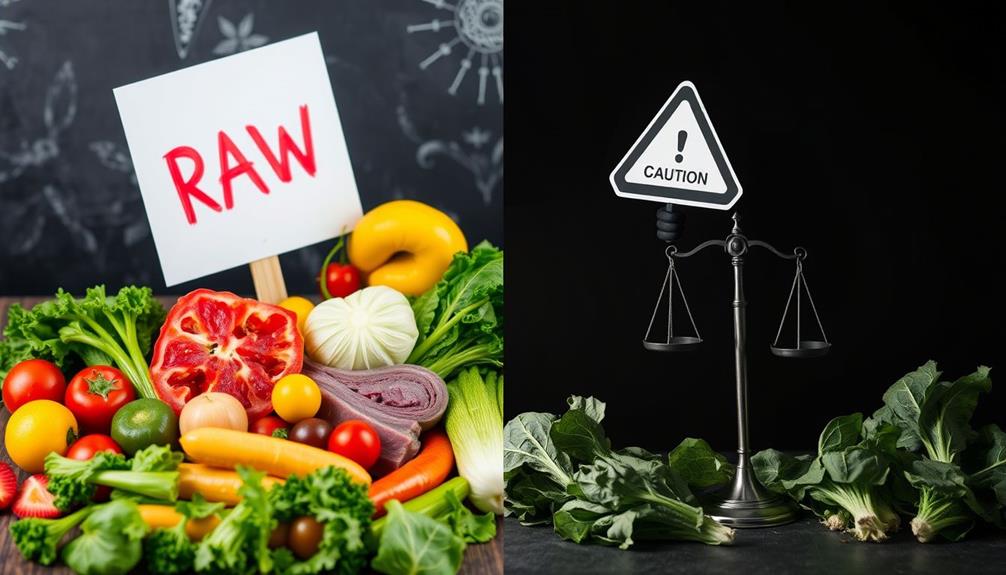
When you follow a raw food diet, you might face nutritional deficiencies, especially in key vitamins and minerals like B12 and iron.
Additionally, consuming raw animal products raises food safety concerns, putting you at risk for harmful pathogens.
It's also important to take into account the potential impact on gut health, as a diet lacking in cooked foods may affect digestion natural remedies alongside conventional medications.
It's essential to be aware of these potential issues as you reflect on this lifestyle.
Nutritional Deficiencies
Experiencing the raw food diet might lead you to overlook essential nutrients, increasing the risk of nutritional deficiencies. Key vitamins and minerals, like vitamin B12, calcium, and vitamin D, are important for maintaining bone health and overall bodily functions. Without these, you could face serious health issues.
It's important to recognize that a well-balanced budget for your diet can help guarantee you're getting the nutrients you need while following any restrictive eating plan.
Here are some potential risks you might encounter:
- Lower bone mass due to inadequate calcium and protein intake.
- Weakened muscle mass from limited protein sources, which are essential for tissue maintenance.
- Tooth decay from high fruit consumption, increasing acidity in your mouth.
- Menstrual irregularities, as about 70% of women on a raw vegan diet report issues potentially linked to weight loss and nutritional deficits.
These deficiencies can lead to further complications, including amenorrhea and decreased bone density, making it necessary to evaluate your nutrient intake.
If you're considering or currently on a raw food diet, think carefully about how to incorporate a variety of foods to meet your nutritional needs. Balancing your meals is important to avoid the risks associated with nutritional deficiencies.
Food Safety Concerns
The raw food diet's appeal can quickly overshadow significant food safety concerns that come with consuming uncooked items. While you might enjoy the freshness of raw fruits and vegetables, it's important to recognize the food safety risks involved. Harmful bacteria like E. coli, Salmonella, and Listeria can lurk in raw or undercooked foods, leading to severe foodborne illnesses.
For instance, raw dairy, eggs, and meat are notorious for their potential to cause food poisoning. Additionally, individuals considering dietary changes should be aware of the potential health impacts of screening methods for conditions like breast cancer, as early detection can be crucial mammography aims to detect breast cancer early.
Even seemingly safe foods can pose health risks. Raw kidney beans contain phytohemagglutinin, which can cause toxicity if not properly cooked. Sprouts, popular in raw diets, have been linked to outbreaks due to their ideal growing conditions for bacteria.
Furthermore, contaminated produce can contribute to foodborne illness outbreaks, making thorough washing important for mitigating these risks. Certain foods, like cassava, can harbor harmful compounds that require proper cooking to eliminate.
Comparisons With Other Diets
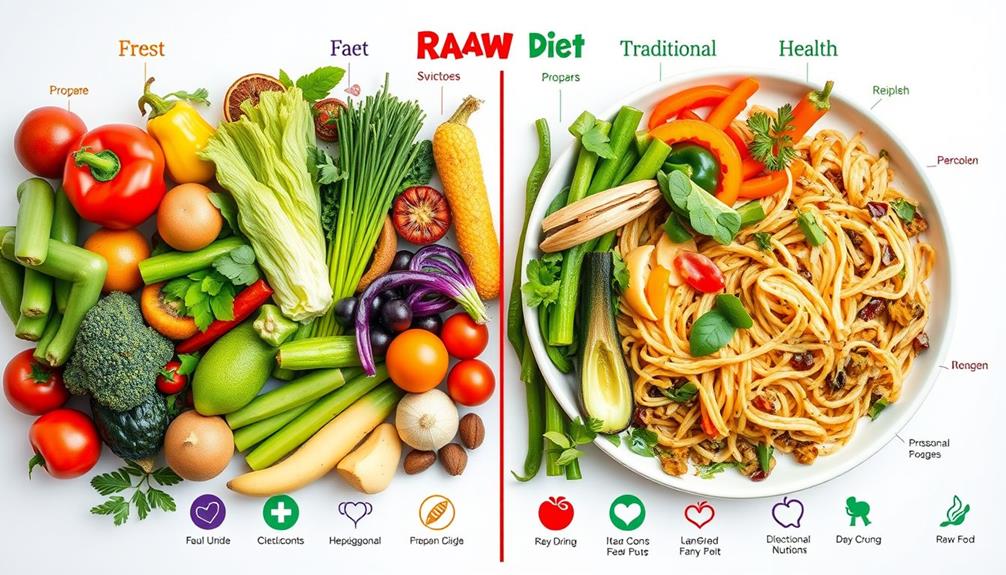
Over time, various diets have emerged, each claiming unique benefits, and the raw food diet often stands in stark contrast to these other approaches.
The Mediterranean diet, for instance, emphasizes cooked whole foods and is linked to lower risks of chronic diseases, showcasing a balanced dietary approach. While the raw food diet may lower cholesterol and triglyceride levels, it also risks nutrient deficiencies compared to other diets.
Additionally, some investment strategies, such as those offered by Noble Gold's educational resources, may help individuals understand how to diversify their portfolios, much like how diversifying dietary approaches can benefit overall health.
Here's how the raw food diet compares with some popular dietary choices:
- Mediterranean Diet: Focuses on cooked foods, providing essential nutrients linked to better health outcomes.
- Low-Fat Vegan Diet: Benefits metabolic health, highlighting cooking's role in nutrient absorption.
- Ketogenic Diet: Associated with increased bad cholesterol and reduced gut diversity, contrasting the raw food diet's claims.
- Health Benefits: Both raw and cooked foods contribute essential nutrients, depending on individual needs.
While raw food adherents promote detoxifying benefits, it's important to recognize that balanced dietary approaches may offer a broader range of health benefits, ensuring you meet all your nutritional requirements.
Long-Term Sustainability

Maintaining a raw food diet long-term raises questions about its sustainability, particularly due to its restrictive nature. While you might experience significant weight loss initially, the limited food options and calorie intake can make adherence challenging over time.
This diet could lead to nutrient deficiencies if you don't carefully plan your meals, as nutritional experts recommend a balanced intake that often includes cooked foods. Moreover, the emotional and psychological growth involved in making dietary changes may influence your long-term success on this diet, as key domains of development in psychology highlight the importance of individual growth in various life aspects.
Meal planning for a raw food diet requires considerable time and skill, which can be intimidating for many individuals. If you're not adept at preparing diverse raw meals, you might find yourself falling back on convenience foods that don't align with your dietary goals.
Additionally, social situations can complicate your commitment to the diet. Dining out or attending gatherings often presents hurdles, leading to feelings of isolation or frustration when your food choices are limited.
Ultimately, while it's possible to follow a raw food diet for a while, ensuring long-term sustainability demands diligence and adaptability. You'll need to reflect on how to incorporate a wider range of foods to maintain your health and social connections.
Practical Tips for Beginners
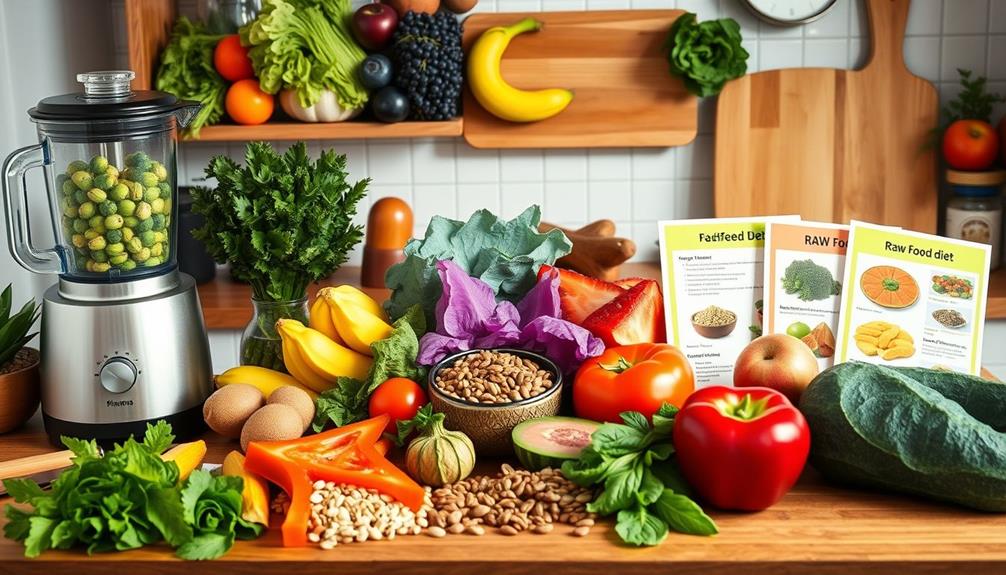
Starting a raw food diet can feel overwhelming, but taking gradual steps makes the shift smoother. Begin by increasing the proportion of raw foods in your meals, aiming for at least 75% of your diet to consist of uncooked or minimally heated foods below 118°F (48°C).
Incorporating fresh herbs and sprouts can elevate the flavors and nutrition of your dishes, much like using unique and wicked planters to enhance your indoor gardening experience. This way, you'll ease into the lifestyle without feeling deprived.
Here are some practical tips to help you get started:
- Invest in a high-quality blender and food processor for efficient meal preparation.
- Focus on seasonal and locally sourced produce for maximum flavor and nutrition.
- Join online communities or local groups focused on the raw food diet for support and motivation.
- Experiment with methods like soaking, sprouting, and dehydrating to diversify meals and enhance the digestibility of certain healthy foods.
Research and Evidence
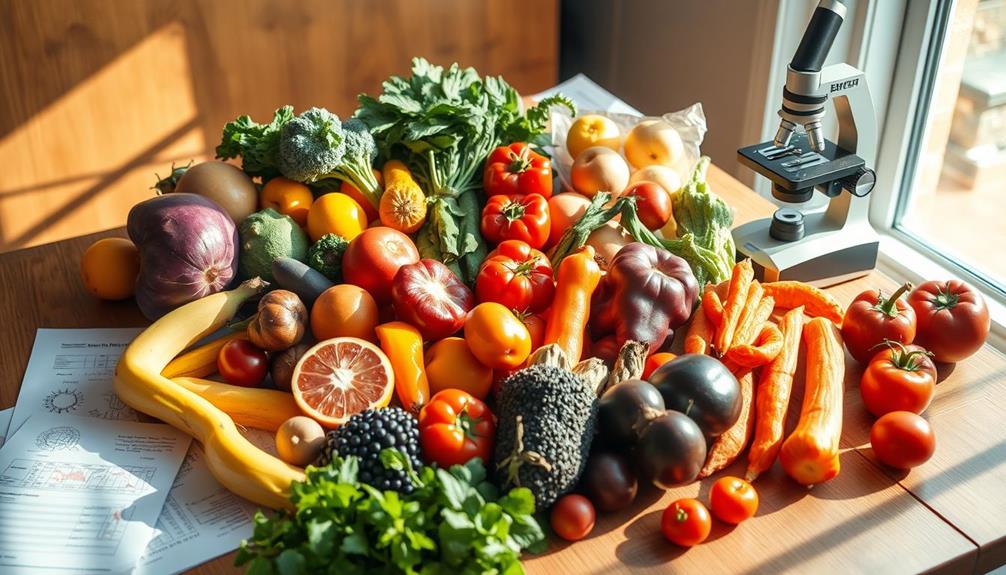
As you explore the raw food diet, understanding the research and evidence behind it can help you make informed choices. Studies indicate that individuals on a raw vegan diet often experience weight loss due to its low-calorie, high-fiber nature.
A systematic review highlighted that this diet can lead to lower cholesterol levels and reduced triglycerides, which can enhance heart health. Participants in observational studies have shown a remarkable 75% lower risk of high blood pressure, suggesting significant benefits for cardiovascular wellness.
However, it's essential to contemplate potential drawbacks. Long-term adherence to the raw food diet may result in deficiencies in essential nutrients like vitamin B12, iron, and omega-3 fatty acids.
These deficiencies can impact bone health and muscle mass, raising concerns about overall well-being. While a high intake of fruits and vegetables may reduce the risk of chronic diseases and promote better health outcomes, balancing these benefits with nutritional needs is imperative.
Dietary Restrictions and Preferences
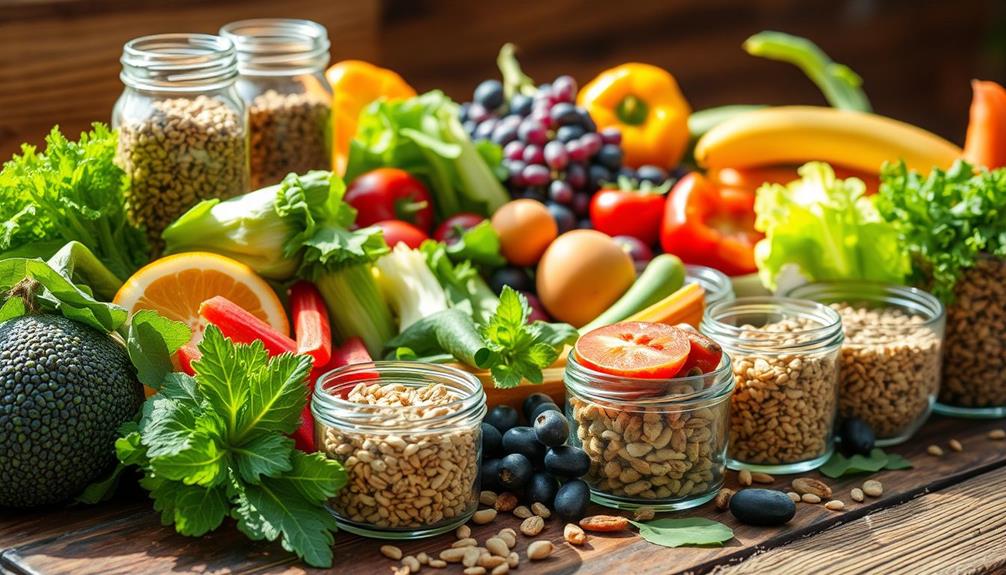
Steering through the raw food diet involves understanding its dietary restrictions and preferences, which primarily cater to vegetarians and vegans.
This lifestyle emphasizes unprocessed plant-based foods, with the raw vegan variant completely excluding animal products. While the diet can be beneficial, careful attention to nutritional needs is essential.
Here are some key considerations:
- Most raw foods are naturally gluten-free, making this diet suitable for those with gluten sensitivities.
- Nutritional needs must be monitored, as deficiencies in essential nutrients like vitamin B12 and omega-3 fatty acids can arise.
- Customization is possible, allowing you to tailor the diet to your specific dietary preferences while adhering to raw principles.
- Certain groups, including pregnant women and seniors, face increased health risks and should generally avoid the raw food diet.
Frequently Asked Questions
What Does Raw Food Do to Your Body?
Raw food boosts your nutrient intake, enhances digestion, and improves skin health. You'll likely feel more energetic and experience better gut health. However, be cautious of potential nutrient deficiencies if you follow this diet strictly.
What Is the Purpose of the Fully Raw Diet?
Did you know that a raw food diet can increase your fiber intake by up to 50%? The purpose of fully raw eating is to enhance your health, boost energy, and support digestive wellness through unprocessed foods.
What Is the Purpose of a Raw Meat Diet?
A raw meat diet aims to provide high-quality protein and essential nutrients, claiming better digestion and energy. You might also find it reduces processed food intake, but be cautious of potential health risks like foodborne illnesses.
What Is the Truth About the Raw Food Diet?
The truth about the raw food diet is mixed. While it can boost nutrient intake, poorly planned versions may lead to deficiencies and health risks. You should consider the potential downsides before fully committing.
Conclusion
In embracing the raw food diet, you might think you're revealing the secret to vibrant health and endless energy. Ironically, while you're munching on those crunchy veggies, you might just be missing out on essential nutrients your body craves. It's almost poetic how the quest for health can lead you to a plate full of limitations. So, before diving headfirst into this leafy lifestyle, consider whether you're truly nourishing yourself or simply joining a trendy food cult.

